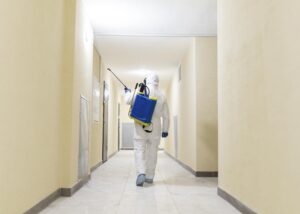Discovering a mouse inside your home is never a good sign. While one mouse might seem harmless, it can signal a larger rodent problem lurking behind the walls. Mice are fast breeders, cause structural damage, and can spread diseases. Left untreated, a small issue can escalate quickly into a full-blown infestation.
If you’re unsure when to call a professional, this guide will help you understand the warning signs, health risks, and benefits of timely rodent control.
Why Rodents Invade Homes
Rodents, including mice and rats, are drawn to homes that offer warmth, food, and shelter. These pests can enter through gaps in doors, vents, and pipes — often as small as a dime. Once inside, they nest in dark, quiet areas like attics, garages, wall cavities, and basements.
During cooler months, rodents become even more aggressive in seeking indoor shelter. They can go unnoticed for weeks until visible signs emerge — at which point the infestation may already be significant.
Signs You Have a Rodent Problem
It’s not always easy to tell when a rodent has moved in, but certain indicators can help you act early. Recognizing these signs is crucial to stopping an infestation before it spreads.
Here are key warning signs:
- Droppings around pantries, cupboards, or baseboards
- Scratching or scurrying noises inside walls, especially at night
- Chewed food packaging or wires
- Unusual odors, often musty or ammonia-like
- Grease marks along walls or furniture
- Sightings of live or dead mice
If any of these signs appear consistently, it’s likely time to involve a pest control professional.
When to Call a Rodent Control Specialist
While DIY methods like traps and repellents might help for a small issue, larger infestations require expert care. You should contact pest control when:
1. Rodents Are Active During the Day
Rodents are usually nocturnal. Seeing them in daylight often suggests overcrowding — a major sign of infestation.
2. You’re Hearing Persistent Noises
Scratching, gnawing, or scurrying sounds inside walls or ceilings are usually caused by rodents. These pests often nest in insulation or crawl spaces.
3. DIY Traps Aren’t Working
If bait is disappearing but traps aren’t catching anything — or if the problem continues despite your efforts — it’s time for a professional solution.
4. You Notice Frequent Droppings or Chew Marks
Rodent droppings and gnawing damage show active and growing presence. This is especially serious if you find them in food storage areas.
5. You Have Children, Pets, or Health Concerns
Rodents can spread diseases such as hantavirus, leptospirosis, and salmonella. Their dander and droppings also worsen asthma and allergies. Quick action protects vulnerable household members.
Frequently Asked Questions About Rodents
Q: Are rodents dangerous?
Yes. They damage property and pose health risks through their droppings, urine, and saliva.
Q: Can rodents enter small openings?
Absolutely. Mice can squeeze through gaps as small as 1/4 inch. Rats need only a bit more space. Sealing entry points is critical.
Q: Do rodents return after treatment?
They can — especially if entry points aren’t sealed or food sources aren’t removed. That’s why integrated pest management is essential.
Q: Why do traps sometimes fail?
Rodents are cautious. Poor trap placement, wrong bait, or large infestations can make DIY efforts ineffective.
How to Prevent Rodent Infestations
Prevention is your best defense. Here are simple but powerful habits to help keep your home rodent-free:
Seal entry points:
Close gaps in walls, floors, and around windows and doors. Install door sweeps and weather stripping. Cover vents and chimneys with mesh.
Keep your home clean:
Don’t leave pet food out overnight. Store pantry items in sealed containers. Take out trash regularly and clean under appliances.
Remove clutter:
Rodents love nesting in undisturbed storage boxes, old clothes, or papers. Use plastic containers with lids and avoid clutter buildup.
Eliminate water sources:
Fix leaky faucets and pipes. Use dehumidifiers in basements or crawlspaces to limit moisture.
These habits, paired with routine inspections, make your home less attractive to rodents.
What to Expect from Professional Rodent Control
A professional pest control provider will begin with a thorough inspection to locate all signs of activity. After evaluating the extent of the infestation and identifying entry points, they’ll create a customized treatment plan.
This typically includes:
- Strategic placement of traps and bait stations
- Sealing of entry points (exclusion work)
- Removal of nests or contaminated materials
- Ongoing monitoring to prevent recurrence
Professionals also offer follow-up visits and maintenance plans to ensure long-term protection.
Final Thoughts – Your Local Rodent Control Experts
A rodent infestation can go from minor to major faster than you think. If you’re seeing signs of mice, hearing unusual noises, or finding droppings around your home, don’t delay. Early action saves time, money, and health risks.
Pest Control is proud to serve the families and businesses of Murfreesboro, TN, with trusted, local rodent control solutions that get results. Let our experienced team help protect your property from unwanted pests — reach out today for an inspection and personalized service you can rely on.






